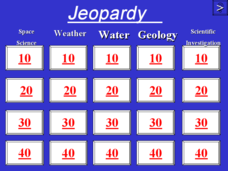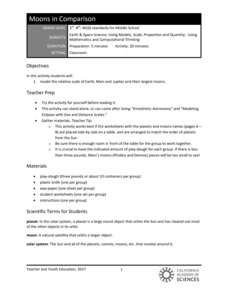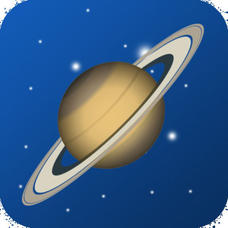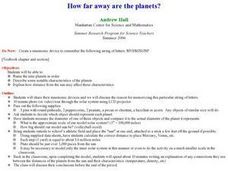Curated OER
Other Objects in the Solar System
In this solar system activity, students complete a crossword puzzle given 11 clues about objects in the sky such as asteroids, meteoroids, comets and planets.
Curated OER
Jeopardy - Earth Sciences
Questions about water, weather, geology, astronomy, and the scientific process make up this Jeopardy game. It is a pretty well-rounded set of slides, although you may want to be aware that a few of the questions are specific to the state...
Laboratory for Atmospheric and Space Physics
Orbit Simulator
Researchers think they have evidence of a new planet deep in our solar system that is the size of Neptune and orbits the sun far beyond Pluto. The orbit simulator shows the orbits of our well-known planets, as well as Pluto and the comet...
TLS Books
Uranus
After reading an informational text passage, learners answer four multiple choice questions about the third largest planet in our solar system.
Curated OER
Dimensions of the Solar System
A set of instructions that help learners draw concentric orbital arcs to scale of each planet. There is a table to complete with data and questions to check understanding of realistic orbits and relative sizes.
Curated OER
Good Vibrations Remote Sensing data Collection: Thermal Emission Spectrometer
The Mars Global Surveyor spent two years creating a mineral map of the planet Mars using thermal emission spectrometry. To help young astronomers understand this remote sensing instrument, have them simulate how data is collected and...
California Academy of Science
Moons in Comparison
Just how big is Earth's moon? With a hands-on simulation, scholars use Play-Doh to model the sizes of the planets Earth, Mars, Jupiter, and their moons. They make predictions as a class, work together to make their models, and discuss...
It's About Time
The Earth-Moon System
Explore the earth-moon system with blossoming astronomers in this fun-filled activity. They begin by investigating lunar phases and differentiating between each. They continue the activity by learning about tidal forces and how these are...
Q Continuum
Planets
Have you ever looked up at the night sky and wondered what constellation you were seeing or whether that bright object was a star or a planet? Are you searching for the best tilt-to-view constellation and planet app that money can't buy?...
CK-12 Foundation
CK-12 Earth Science Concepts for Middle School
Explore a variety of science concepts in an interactive textbook created for middle school scholars. A lengthy table of contents takes readers to pages comprised of a subject overview, outline, and summary. Follow links further to find...
Curated OER
Space Science
Eighth graders study the objects in our solar system. In this space lesson students identify and describe planets, then classify them as terrestrial or gaseous.
Curated OER
How Far Away Are the Planets?
Students name nine planets in order, describe some notable characteristics of the planets, explain how distance from the sun may affect these characteristics, and create solar system models.
Curated OER
The Planet Mars
Fifth graders gain knowledge about Mars and Earth. In this compare and contrast lesson, 5th graders use visual representations of the solar system to observe the characteristics of the planets. Students read fiction and nonfiction...
Curated OER
The Solar System
In this science worksheet, learners learn the names of the 9 planets in our solar system (Pluto is still included here) and locate them in a word search. Students answer 9 questions about the planets--their positions and attributes.
Curated OER
Solar System Adventure
Students study the solar system and our galaxy, then write a science fiction story based on what they discover. They utilize worksheets and access websites imbedded in this plan to gain ideas for their stories.
Curated OER
The Solar System
For this solar system worksheet, learners complete a word puzzle by determining the terms associated with the 10 statements about the planets.
Curated OER
Venus
Looking for a good worksheet to help teach about the planet Venus? This worksheet is for you! An excellent photograph of Venus accompanies three paragraphs of text. Learners answer five multiple choice questions based on what they've...
Curated OER
Bringing the Solar System to Life
Students make models of the planets and use the models to show revolution of the planets around the sun. They explain the rotation of the planets after demonstrating with balloons.
Teach Engineering
Get Me Off This Planet
What do Newton's Laws have to do with getting from Earth to Mars?The activities in this resource show how Newton's Laws work with rockets to get them into space. Background information includes facts about orbits and how orbits...
McGraw Hill
Extra Solar Planets Interactive
Studying what you can't see can be challenging. Discover how scientists use indirect measurements to prove the existence of planets and estimate their sizes. The introduction explains the symbiotic movement of planets and stars during an...
Howard Hughes Medical Institute
Distribution of Elements in Earth’s Crust
How do scientists know the difference between a meteorite from space and a regular rock from the earth? Scholars read a passage and answer comprehension questions about the creation of the solar system. They extrapolate the main ideas to...
Utah Education Network (UEN)
Utah Open Textbook: Earth and Space Science
From the vast universe to natural disasters, Earth and Space Science studies phenomena near and far. A complete textbook offers informational resources for a high school Earth and Space Science course. Chapters include topics such as the...
Curated OER
Exploring the Solar System
For this exploring the solar system worksheet, 6th graders use the online Gizmo then answer 14 questions and complete a chart about planets and orbits.
Curated OER
Our Solar System
In this solar system worksheet, students complete a database comparing the 9 different planets' mass, surface temperature, rotation period, orbital period, moons, and distinguishing features. This worksheet is a graphic organizer.

























